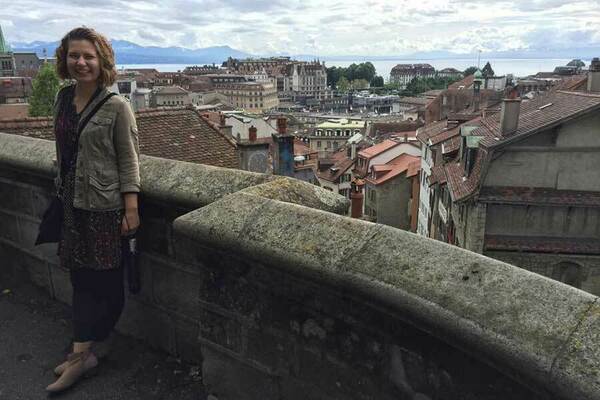
Brittany Ebeling ('18), a double-major in International Economics and Peace Studies, received The R. Stephen and Ruth Barrett Family Grant to complete a summer internship with the International Organization for Migration (IOM). Her experience was transformative. Brittany recently wrote to us about her internship:
Owing to the generosity of the Nanovic Institute, I completed an internship during the summer of 2016 with the International Organization for Migration headquarters office in Geneva, Switzerland. As an undergraduate student, my studies and out-of-classroom experiences have centered on the study of migration and forced displacement. My internship was heavily motivated by a desire to understand the centrally organized International Organization (IO) and United Nations (UN) network, discern my degree of interest in working in the long-term in this capacity, and academically benefit from deep engagement with migration policy and debate. Unquestionably, this experience grounded and catalyzed the direction of my undergraduate experiences into a more enriched form of engagement with issues of migration.
As an intern with the IOM, I worked for the Governing Bodies Division within the International Cooperation and Partnerships (ICP) branch of the headquarters office. My primary responsibilities included assisting the organization of IOM’s International Dialogue on Migration (IDM), an annual convening of IOM member states (with a special focus on achieving the migration-related targets of the Sustainable Development Goals), supporting the activities of the IOM Council meeting in which member states voted for the IOM to join the United Nations system, and communicating with field and regional IOM offices. This internship offered abundant opportunities to work in French, Spanish, and English in a professional context, thereby improving my language proficiency and translation skills. I attended the Council meeting of member states in which the People’s Republic of China and Tuvalu became IOM member states and the resolution for the IOM to join the UN system was nearly unanimously supported and subsequently adopted. Furthermore, I drafted the Director General’s opening remarks for the IDM, wrote official invitation letters to prospective IDM panelists (including government Ministers, academics, and civil society representatives), and prepared a conference panel concept note building upon the September 19th United Nations High Level Plenary on Refugees and Migrants.
Working with the ICP division, I collaborated with the legal, labor migration, and environmental displacement departments of the organization, all of which offered significant insight into the full spectrum of activities undertaken by IOM’s field offices. Following a semester of studying abroad in Dakar, Senegal, I entered this internship experience with questions about diaspora empowerment strategies, south-south collaboration frameworks, and international frameworks for addressing environmental displacement concerns, particularly in drought-prone regions and coastline areas.
The culture of mentorship and academic engagement I experienced as an IOM intern far exceeded my expectations. I met with department heads within and outside of my department, had access to IOM and UN library and intranet data source resources, attended bi-weekly intern lunches with staff member presentations, and participated in a departmental retreat during which I learned about the organizational structure of IOM’s many bodies and the ways in which they are interconnected. Perhaps most importantly, I learned from mentors at all career stages about the nuances of professional development and growth within the IO/UN sector.
I could not have imagined a more fruitful and engaging experience to follow my semester studying abroad in Senegal. Several weeks after the conclusion of my internship, I was honored to present my paper on West African diaspora communities in Southern Europe at an undergraduate conference in Budapest, owing once again to the generosity of the Nanovic Institute. My work at IOM offered significant insights and improvement to this conference presentation. Having decided to take an academic and professional leave of absence in Senegal during the 2016-2017 academic year, my supervisors at IOM headquarters offered their kind and ongoing support through a letter of recommendation to the IOM Senegal country office. Thanks to their generous encouragement and support, I am currently interning at IOM Senegal, an opportunity that has built upon and further informed my internship at IOM’s headquarters office. Furthermore, my time in Geneva has informed the direction of my undergraduate senior thesis, for which I am currently performing data collection and analysis in Senegal under the umbrella of migration and diaspora networks.
I cannot express the extent of my gratitude to the Nanovic Institute for its ongoing, deep support. Undertaking this internship experience was made possible only through its generosity. Its impact is far-reaching and has already had implications for my further work and studies, including the formation of my thesis research in Senegal, current internship with IOM Senegal, and plans for post-graduate studies. This opportunity has opened doors to networks of professional support within the IO and UN system, exposed me to several significant actors in the field of migration studies, and prompted me to tangibly consider how I intend to do the most good and the least harm as I research, work, and direct my future plans. For these opportunities to discern, experience, and challenge these plans, I remain very grateful to the Nanovic Institute, its staff, and its donors that made this experience possible.